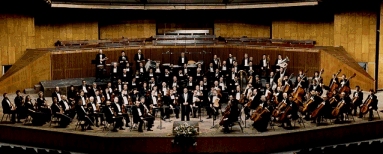

|
 Concerto
for Orchestra Sz116 Concerto
for Orchestra Sz116
A short while before his death, Bartok wrote his best piece ever, and
this is actually the work that has given him his greatest fame, a little
after his premature death, due to a malignant disease.
Bartok's last piece is the Concerto for Orchestra. However anyone who
knows the different musical forms knows a concerto is designated for a
solo instrument (and an orchestra), not an entire orchestra. With Bartok,
everybody gets a solo part:
|
1
|
In the first movement, the cellos and the double basses
play a theme that serves as a repeated motif, which will reappear throughout
the work.
|
|
2
|
The "pair game" movement, in which a pair of
bassoons plays a cheerful theme, and then come pairs of identical instruments
(oboes, clarinets, flutes and trumpets), playing the theme in all different
ways.
|
|
3
|
The "Lament" and mourning movement, in which
themes of the first movements returned, after a mysterious opening in the
lower strings; the movement ends in the same enigmatic, silent atmosphere.
|
|
4
|
A fourth movement, the "Interrupted interlude"
is the movement most spoken of in Bartok's Concerto for Orchestra. A light
playing of the repeated theme by the strings, contrasted by the woodwinds,
as if joking, is interrupted by a foreign invader, the "Invasion march"
from Shostakovich's 7th Symphony. The orchestra imitates the invading theme,
mocks it with the trombone, and eventually sends it away, defeated.
|
|
5
|
The concluding movement opens with the cheering French
horn, followed by a new theme, of a light, dancing character. From now
on materials and subjects from the main theme will be incorporated, and
the movement becomes a grand finale to this amazing piece.
|
Bartok gained fame with his Concerto for Orchestra.
However this masterpiece also contains criticism about the success of Shostakovich's
Symphony no. 7. This symphony won universal popularity, for the story of
the heroic withstanding of the people of Leningrad against the German siege
during World War II. Bartok thought it was successful for all the wrong
reasons, since in his opinion it was not as good as the masses believed.
|